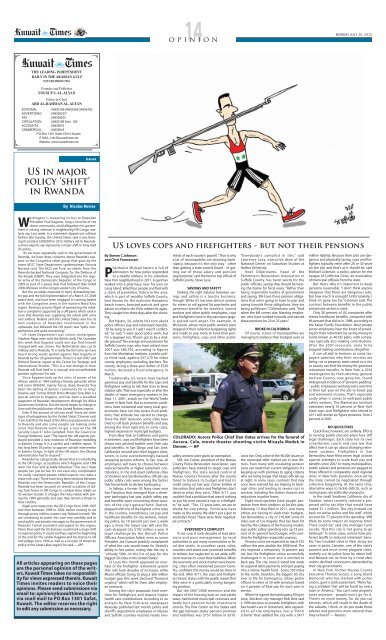UAE widENS cRAckdOwN; MORE ISlAMiStS ... - Kuwait Times
UAE widENS cRAckdOwN; MORE ISlAMiStS ... - Kuwait Times
UAE widENS cRAckdOwN; MORE ISlAMiStS ... - Kuwait Times
Create successful ePaper yourself
Turn your PDF publications into a flip-book with our unique Google optimized e-Paper software.
THE LEADING INDEPENDENT<br />
DAILY IN THE ARABIAN GULF<br />
ESTABLISHED 1961<br />
Founder and Publisher<br />
YOUSUF S. AL-ALYAN<br />
Editor-in-Chief<br />
ABD AL-RAHMAN AL-ALYAN<br />
EDITORIAL : 24833199-24833358-24833432<br />
ADVERTISING : 24835616/7<br />
FAX : 24835620/1<br />
CIRCULATION : 24833199 Extn. 163<br />
ACCOUNTS : 24835619<br />
COMMERCIAL : 24835618<br />
P.O.Box 1301 Safat,13014 <strong>Kuwait</strong>.<br />
E MAIL :info@kuwaittimes.net<br />
Website: www.kuwaittimes.net<br />
US in major<br />
policy ‘shift’<br />
in Rwanda<br />
W ashington<br />
Issues<br />
By Nicolas Revise<br />
is loosening its ties to Rwandan<br />
President Paul Kagame, long a favorite of the<br />
donor community, amid allegations his government<br />
is stirring violence in neighboring DR Congo, analysts<br />
say. Last week, in a statement slipped out without<br />
fanfare late Sunday, the United States said it was freezing<br />
its modest $200,000 in 2012 military aid to Rwandaa<br />
move experts say represents a major shift in long-held<br />
US policy.<br />
“As we have repeatedly said to the government of<br />
Rwanda, we have deep concerns about Rwanda’s support<br />
to the Congolese rebel group that goes by the<br />
name M23,” State Department spokeswoman Victoria<br />
Nuland said. The M23 are Tutsi ex-rebels from the<br />
Rwanda-backed National Congress for the Defense of<br />
the People (CNDP). They were integrated into the regular<br />
army of the Democratic Republic of the Congo in<br />
2009 as part of a peace deal that followed their failed<br />
2008 offensive on the Congo’s eastern city of Goma.<br />
But the ex-rebels mutinied in April, demanding better<br />
pay and the full implementation of a March 23, 2009<br />
peace deal, and have been engaged in running battles<br />
with the Congolese army in the eastern Nord Kivu<br />
region. Kinshasa accuses Kigali of sponsoring the rebellion-a<br />
complaint supported by a UN panel, which said in<br />
June that Rwanda was supplying the rebels with arms<br />
and soldiers. Nuland said the United States also has its<br />
own evidence of Rwandan involvement in the<br />
upheavals, but believed the UN report was “quite comprehensive<br />
and quite concerning.”<br />
US State Department war crimes investigator<br />
Stephen Rapp even told the British daily The Guardian<br />
this week that Kagame could one day find himself<br />
charged with war crimes. The Netherlands also cut its<br />
military aid to Rwanda. “It is really the first time we have<br />
heard strong words spoken against Paul Kagame in<br />
Rwanda by the US government. There is a real shift,” said<br />
Richard Downie, expert at the Center for Strategic and<br />
International Studies. “This is a real change in tone.<br />
Rwanda will find itself in a unusual and uncomfortable<br />
position right now,” he said.<br />
Since Kagame took up the reins of power of his<br />
African nation in 1994 ending a bloody genocide which<br />
left some 800,000, mainly Tutsis, dead, Rwanda “has<br />
been the darling of donors’ community for so long,”<br />
Downie said. Former British Prime Minister Tony Blair is a<br />
special advisor to Kagame, and has been a steadfast<br />
supporter of Rwanda’s development through his Africa<br />
Governance Initiative. But the winds began to change in<br />
June with the publication of the United Nations report.<br />
Even if the amount of aid was small “there are other<br />
signs of unhappiness by the United States,” Downie said.<br />
“I am told that the head of the Africom postponed a visit<br />
to Rwanda and also some people are making some<br />
noise that Rwanda wants to get a seat on the UN<br />
Security Council.” John Campbell, from the Council on<br />
Foreign Relations, said: “The report the UN experts produced<br />
provided a clear evidence of Rwandan meddling<br />
in Eastern Congo. It is a careful and credible report. “It<br />
has long been US policy to oppose outside intervention<br />
in Eastern Congo. In light of the UN report, the Obama<br />
administration had to respond.”<br />
Rwanda has categorically denied that it is interfering<br />
in the DR Congo, accusations which Kagame told CNN<br />
were “not true” and “actually ridiculous.” “You see, I hope<br />
people can just be fair. It’s not even very complicated.<br />
I’m really surprised people called experts can make a<br />
report this way.” There have long been tensions between<br />
Rwanda and the Democratic Republic of the Congo.<br />
Rwanda has been accused on several occasions of aiding<br />
Tutsi forces in DR Congo to combat Hutu rebels on<br />
its western border. It charges the Hutu rebels with joining<br />
the 1994 genocide and says they remain a threat to<br />
their country.<br />
Kigali sent troops into the DR Congo from 1996-1997<br />
and then between 1998 to 2002, before moving to act<br />
through proxy militias, experts say. Nuland insisted: “We<br />
are continuing to watch this case very carefully and to<br />
send public and private messages to the government of<br />
Rwanda.” French journalist and expert on the region,<br />
Pierre Pean said the US decision could mark a major shift<br />
in regional policy. It could “perhaps signal the beginning<br />
of the end for the soldier Kagame and his license to kill<br />
and pillage since 1994 as well as a revision of American<br />
policy in the Great Lakes region,” he said.— AFP<br />
All articles appearing on these pages<br />
are the personal opinion of the writers.<br />
<strong>Kuwait</strong> <strong>Times</strong> takes no responsibility<br />
for views expressed therein. <strong>Kuwait</strong><br />
<strong>Times</strong> invites readers to voice their<br />
opinions. Please send submissions via<br />
email to: opinion@kuwaittimes.net or<br />
via snail mail to PO Box 1301 Safat,<br />
<strong>Kuwait</strong>. The editor reserves the right<br />
to edit any submission as necessary.<br />
By Steven C Johnson<br />
and Chris Francescani<br />
P harmacist<br />
Michael Nastro is full of<br />
admiration for how police responded<br />
to a deadly robbery in his suburban<br />
New York neighborhood in 2011. A gunman<br />
walked into a pharmacy near his own on<br />
Long Island, killed four people and fled with<br />
a stash of painkillers. Police in the area,<br />
which is part of wealthy Suffolk County,<br />
best known for the exclusive Hamptons<br />
beach towns, boosted patrols and gave<br />
advice on what to do if the robber hit again.<br />
They caught him three days after the shooting.<br />
But Nastro, 50, admits he’s torn about<br />
police officers’ pay and retirement benefits.<br />
“I’d be lying to you if I said I wasn’t conflicted,”<br />
he said. “I want good police work, but<br />
I’m a taxpayer too. There’s got to be a middle<br />
ground.” The average annual pension for<br />
Suffolk County cops who have retired since<br />
2007 was $86,702, according to figures<br />
from the Manhattan Institute, a public policy<br />
think tank, against $37,270 for other<br />
county employees, excluding teachers. The<br />
county, facing a three-year deficit of $530<br />
million, declared a fiscal emergency in<br />
March.<br />
Traditionally, US voters have backed<br />
generous pay and benefits for the cops and<br />
firefighters willing to risk their lives to keep<br />
citizens safe. That was especially so after the<br />
deaths of many emergency workers in the<br />
Sept 11, 2001, attack on the World Trade<br />
Center in New York. But as economic conditions<br />
have worsened and many local governments<br />
have run into severe fiscal problems,<br />
that attitude has started to change.<br />
Since the 2007 recession, some cities have<br />
tried to roll back pension benefits and pay,<br />
among the most rigid and, in some cases,<br />
highest expenses in municipal budgets.<br />
From New York to California and points<br />
in between, cops and firefighters have been<br />
drawn into pitched battles over their pay<br />
and benefits. In San Diego and San Jose,<br />
California’s second and third biggest cities,<br />
voters in June overwhelmingly backed<br />
sweeping pension reforms. In San Jose, all<br />
employees will have to choose between<br />
reduced benefits or higher retirement contributions.<br />
In the mid-sized California cities<br />
of Stockton and San Bernardino, officials say<br />
public safety costs were among the factors<br />
that forced both to declare bankruptcy.<br />
In Vallejo, a former US Navy town near<br />
San Francisco that emerged from a threeyear<br />
bankruptcy last year, public safety pay<br />
and benefits were consuming three-quarters<br />
of the city’s general fund. Detroit,<br />
plagued with one of the highest crime rates<br />
in the country, nonetheless cut pay and<br />
healthcare benefits for city workers, including<br />
police, by 10 percent just over a week<br />
ago, a move the mayor says will save the<br />
cash-strapped city $102 million a year. A<br />
legal challenge by the Detroit Police<br />
Officers Association failed, even as union<br />
President Joe Duncan publicly complained<br />
of what the cuts would mean for Detroit’s<br />
ability to hire police, noting that the city is<br />
“already 50th on the list of pay for the<br />
biggest 50 cities in the United States.”<br />
St Louis this month approved an overhaul<br />
of the firefighter retirement system<br />
that rolls back decades of increases, while<br />
Miami officials trying to plug a $60 million<br />
budget gap this week declared “financial<br />
urgency,” which will let them alter employee<br />
contracts.<br />
Among the city’s proposals: limit overtime<br />
for firefighters and require higher<br />
health care contributions. According to an<br />
analysis by New York-area newspaper<br />
Newsday published last month, police and<br />
sheriff’s department employees in Nassau<br />
and Suffolk counties reached nearly two-<br />
14 opinion<br />
thirds of each county’s payroll. “That is why<br />
a lot of municipalities are choosing bankruptcy,<br />
because it’s the only way - other<br />
than getting a state control board - of getting<br />
out of these salary and pension<br />
requirements,” said the former top official of<br />
Suffolk County, Steve Levy.<br />
SAVINGS AND SAFETY<br />
Striking the right balance between savings<br />
and safety is a touchy business,<br />
though. While it’s become almost routine<br />
for voters to rail against fat paychecks and<br />
generous benefits for teachers, transit<br />
workers and other public employees, cops<br />
and firefighters have in the past been largely<br />
spared such anger. For example, in<br />
Wisconsin, where most public workers were<br />
stripped of their collective bargaining rights<br />
and made to pay more to fund their pensions,<br />
firefighters, cops and other public<br />
safety workers were given an exemption.<br />
Still, Jim Carver, president of the Nassau<br />
County Police Benevolent Association, says<br />
politicians have started to target cops and<br />
firefighters. The state seized control of<br />
Nassau County’s finances after the county<br />
failed to balance its budget and had its<br />
credit rating cut last year. Carver bristles at<br />
the notion that police and firefighters don’t<br />
deserve what they earn. “After 9/11, you<br />
couldn’t find a politician that wasn’t rushing<br />
to put his arms around a cop or a firefighter,”<br />
he said. “Ten, 12 years later, we are to<br />
blame for everything. Politicians have<br />
made us the enemy. We didn’t put a gun to<br />
anybody’s head. These were fairly negotiated<br />
contracts.”<br />
EVERYBODY’S COMPLICIT<br />
To be sure, it took decades of bad decisions<br />
and poor management by local<br />
authorities to put many communities in fiscal<br />
dire straits. In countless cases, cities,<br />
counties and states over-promised benefits<br />
to retirees but neglected to set aside sufficient<br />
reserves to cover their liabilities. When<br />
the economy and stock market were booming,<br />
cities often sweetened pension benefits,<br />
confident the money would be there in<br />
the end. After 9/11, the cops and firefighters’<br />
heroic status with the public meant that<br />
they were in a particularly strong bargaining<br />
position.<br />
But the 2007-2008 recession and the<br />
impact of the housing bust on real estate<br />
taxes hammered municipal revenues and<br />
badly hurt pension funds’ investment<br />
returns. The Pew Center on the States said<br />
the gap between states’ pension promises<br />
and liabilities was $757 billion in 2010.<br />
“Everybody’s complicit in this,” said<br />
Lawrence Levy, executive dean of the<br />
National Center on Suburban Studies at<br />
Hofstra University.<br />
Noel DiGerolamo, head of the<br />
Patrolmen’s Benevolent Association in<br />
Suffolk County, has harsh words for the<br />
public officials, saying they should be bearing<br />
the blame for fiscal woes. “Rather than<br />
being responsible leaders of government<br />
and saying, ‘We have these pension obligations<br />
that we’re going to have to pay,’ and<br />
saving towards those obligations, they are<br />
being politicians,” DiGerolamo said. “And<br />
when the bill comes due, blaming employees<br />
who have worked towards and earned<br />
these pensions for 20 or 25 years.”<br />
BROKE IN CALIFORNIA<br />
Of course, scores of municipalities are<br />
managing to balance their budgets even as<br />
costs rise. Only a few of the 90,000 issuers in<br />
the municipal debt market are in true distress.<br />
Even many with escalating pension<br />
costs can meet their current obligations. It’s<br />
keeping up with promises to aging citizens<br />
who are living longer that keeps officials up<br />
at night. In some cases, contracts that may<br />
once have seemed fair are helping to bankrupt<br />
cities and leading to severe cuts in<br />
services, including fire station closures and<br />
reductions in police forces.<br />
Eight municipalities have sought protection<br />
from their creditors so far this year,<br />
following 13 that filed in 2011, and many<br />
others are having to slash their budgets.<br />
San Bernardino, a city of 210,000 some 65<br />
miles east of Los Angeles that has been hit<br />
hard by the collapse of the housing market,<br />
says public safety spending eats up 73 percent<br />
of its general fund budget, with overtime<br />
for firefighters especially onerous.<br />
Pension costs are expected to reach $25<br />
million this year, double the 2006 level. The<br />
city imposed a temporary 10 percent pay<br />
cut, but the firefighters’ union successfully<br />
challenged it in court and is entitled to<br />
back pay. The city council voted last week<br />
to suspend debt payments and quit paying<br />
into a retiree health fund. Some 350 miles<br />
to the north, Stockton, the biggest US city<br />
ever to file for bankruptcy, allows police<br />
officers to retire at 50 with pensions based<br />
on 3 percent of final pay for each year in<br />
service.<br />
When he signed the bankruptcy filing in<br />
June, Stockton city manager Bob Deis said<br />
a 1996 decision to provide firefighters with<br />
free health care in retirement, later expanded<br />
to all city employees, was a “Ponzi<br />
scheme” that saddled the city with a $417<br />
MONDAY, JULY 30, 2012<br />
US loves cops and firefighters - but not their pensions<br />
COLORADO: Aurora Police Chief Dan Oates arrives for the funeral of<br />
Aurora, Colo, movie theater shooting victim Micayla Medek in<br />
Denver. — AP<br />
million liability. Because their jobs are dangerous<br />
and physically taxing, cops and firefighters<br />
typically retire after 20 or 30 years<br />
on the job, and that’s as it should be, said<br />
Michael Coleman, a policy adviser for the<br />
League of California Cities, an association<br />
of municipal officials from the state.<br />
But that’s why it’s important to keep<br />
pensions reasonable. “I don’t think anyone<br />
disagrees that these are dangerous jobs.<br />
But how much is enough? Unfortunately, I<br />
think it’s gone too far,” Coleman said. The<br />
contrast between benefits in the public<br />
and private sectors is stark.<br />
Only 26 percent of US companies offer<br />
retiree healthcare benefits, compared with<br />
66 percent that did so in 1988, according to<br />
the Kaiser Family Foundation. Most private<br />
sector employees bear the brunt of providing<br />
for their retirement by saving money in<br />
funds known as 401(k) plans, with companies<br />
typically also making contributions.<br />
After the 2007 recession, some firms<br />
stopped making contributions altogether.<br />
It can all add to tensions as some taxpayers<br />
question why their services are<br />
being cut or property taxes raised so a city<br />
or county can find the money for generous<br />
retirement benefits. In New York, a 2010<br />
investigation by then-attorney general<br />
Andrew Cuomo, now governor, found<br />
widespread incidence of “pension padding”<br />
- public employees working extra overtime<br />
in their last year on the job to boost pay<br />
and retirement income. That’s especially<br />
costly when it comes to well-paid public<br />
safety workers. The Manhattan Institute<br />
estimates nearly 10 percent of New York<br />
State cops and firefighters who retired in<br />
2011 will receive six-figure pensions, from 2<br />
percent in 2001.<br />
NO QUICK FIXES<br />
Quick fixes, however, are unlikely. Efforts<br />
to revamp public pension plans face stiff<br />
legal challenges. Each state has its own<br />
constitution, courts and case law that<br />
affect how it can go about changing retirement<br />
systems. Firefighters in San<br />
Bernardino have filed seven legal actions<br />
against attempts to scale back pay and<br />
benefits since 2007. In many municipalities,<br />
public salaries and pensions are pegged to<br />
those offered in comparably sized regional<br />
cities. In New York, pensions, once set by<br />
the state, cannot be negotiated through<br />
collective bargaining. At the same time,<br />
alternative ways to tackle deficits, such as<br />
raising taxes, are politically unpopular.<br />
In the small Southern California city of<br />
Stanton, voters recently rejected a proposed<br />
utility tax hike that would have<br />
raised $1.1 million. The city instead cut<br />
back on active police and fire staff, which<br />
account for 77 percent of its spending. “Will<br />
there be some impact on response time?<br />
There could be,” said city manager Carol<br />
Jacobs. “But this city is not going to go<br />
bankrupt.” In some cases, unions have preferred<br />
layoffs to reduced retirement benefits.<br />
Two troubled cities in New Jersey are<br />
cases in point. Camden, one of the state’s<br />
poorest and most crime-plagued cities,<br />
recently cut its police force by about half,<br />
and Newark cut its force by a third after<br />
unions declined concessions demanded by<br />
their city governments.<br />
In New York, former Nassau County<br />
Executive Thomas Suozzi, a Long Island<br />
Democrat who has clashed with police<br />
unions, gave a stark assessment. “We’re facing<br />
a problem that will be faced by every<br />
town in America. “You can’t raise property<br />
taxes anymore - people won’t go for it.<br />
There’s no more money. So, do you cut<br />
services, which will result in the death of<br />
the suburbs, I think, or do you make these<br />
salaries and pensions more rational than<br />
they’ve been?”— Reuters

















